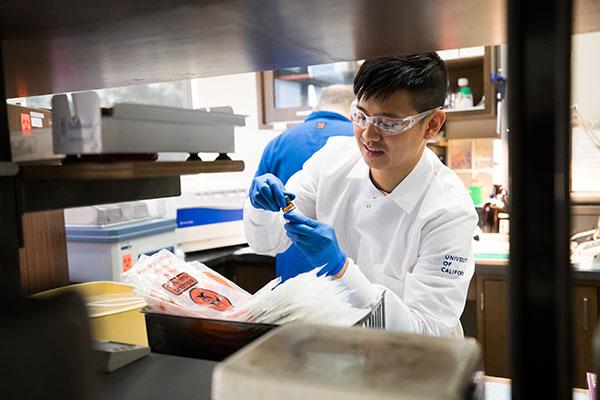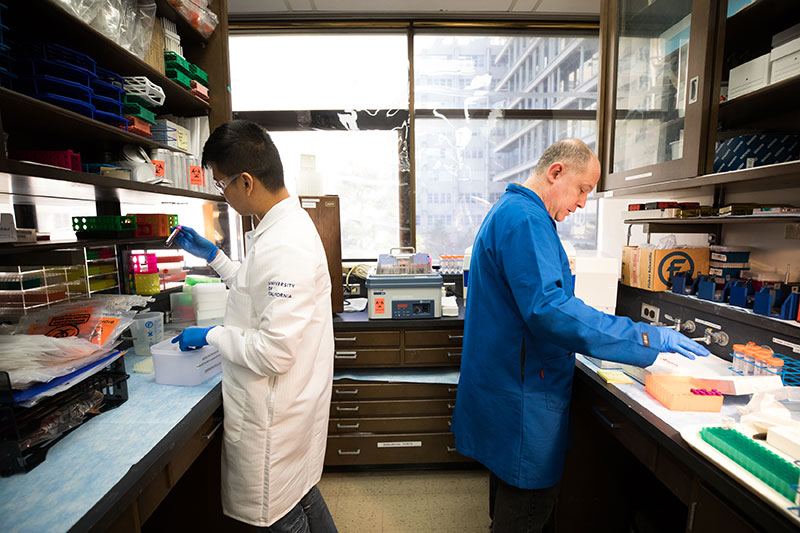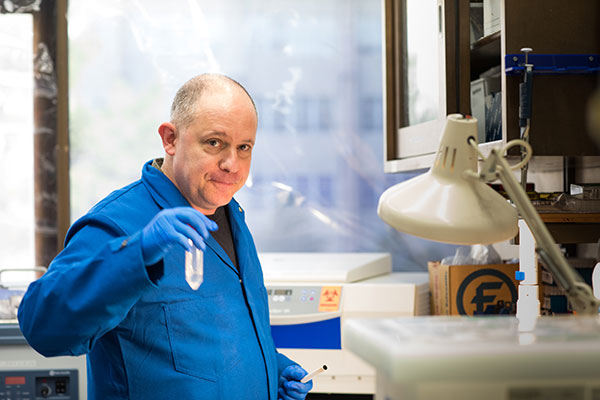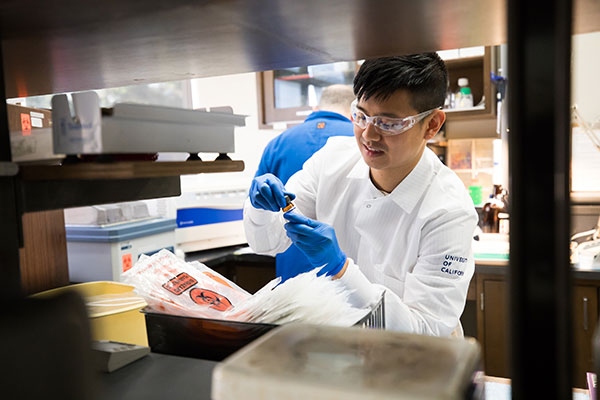

By Milenko Martinovich
Photography by Elisabeth Fall
Staff members Anatol Sucher and Sergio Diaz are usually found performing painstaking tests in the School of Nursing’s Genomics Laboratory. They are entrusted with valuable specimens linked to pivotal work on improving lives from newborns to adults stricken with chronic diseases.
“They are really careful and meticulous about what they do from start to finish,” said Associate Professor Elena Flowers, PhD, RN, the lab’s director. “They are the link between the research questions we conceive of and the fundamental implementation of these research studies. They are critically important.”
A significant function of the lab is housing genomic samples. The lab holds tens of thousands of specimens of blood, plasma, serum and other materials from about 5,000 individuals stored in freezers that reach 80 degrees below Celsius. The lab is a major storage facility for UCSF’s Preterm Birth Initiative, which is designed to eliminate racial disparities in preterm birth and improve health outcomes for babies born too soon. Flowers said the lab has been acquiring materials from the Preterm Birth Initiative at a rapid pace, and there is “tremendous future potential” in the work ahead.
Diaz said the lab receives specimens, such as blood, saliva and breastmilk from women at various times during their pregnancies and after birth. Sucher and Diaz process the samples, usually separating them into different components through a centrifuge, then store them.

“It’s kind of like running a library,” Sucher said. “You’ve got to figure out where to put things and how to keep track of where it is.”
But Sucher, the lab’s manager, and Diaz, a research associate, have more important roles than storing samples. In addition to separating blood to isolate its components for further analysis, they measure DNA concentration using a spectrophotometer, which projects light through DNA samples. They’ve duplicated strands of DNA using a method called polymerase chain reaction. They’ve conducted allelic discrimination, analyzing DNA to identify a study participant’s or patient’s genetic traits.
“They make it so we can collect these valuable specimens and deliver it to them with a tremendous amount of confidence,” Flowers said. “And nothing can replace their insights when they’re at the bench doing the work.”
Sucher, who has worked in the lab since 2007, is meticulous with details, Flowers said.
“He’s very true to his work, very dedicated,” she said. “He supports everyone; he’s a mentor in that way.”
Diaz, who joined the lab in 2017, is often tasked with exploring the procedural aspects of new avenues of discovery for the lab.
“He’s willing to tackle anything,” Flowers said. “Whether it’s looking at new equipment or learning new protocols, he’s ambitious.”

Although Sucher has been conducting important experiments for more than a decade, one of his proudest achievements didn’t involve test tubes or a centrifuge machine. One of his biggest headaches as manager years back was organizing the lab’s samples. Then, field staff would bring in samples and log them in non-uniform ways, leaving Sucher to figure out the puzzle and manually record the data. Sucher, in only a few weeks, created a new system where the field staff inputted the data, which, in turn, fashioned both emails alerting researchers of the samples’ entries and produced ready-made labels to affix to the specimens, making the lab more efficient.
“It’s like an art for him to streamline and organize,” Diaz said.
The lab has aided numerous faculty over the years. Sucher reports that materials from the research of Christine Miaskowski, RN, PhD, FAAN have a long and successful history of collaboration and occupy the most storage space in the lab. Kord Kober, PhD, co-director of the lab, utilizes the lab’s resources for his cancer-related research, as does Annesa Flentje, PhD, whose work focuses on LBGTQ communities. Heather Leutwyler, RN, PhD, NP Monica McLemore, PhD, MPH, RN Glenn-Milo Santos, PhD, MPH, and Xiao Hu, PhD, have also banked specimens in the lab and hope to grow this area of their programs of research in the future.
